The Chinese company Beijing Zhongnong Futong Gardening Co., Ltd. and the Dutch company Tomato World signed an agreement on October 24th, 2019. The Dutch subsidiary company of Zhongnong Futong will become a golden member of Tomato World in 2020. This makes Zhongnong Futong the first Asian member of Tomato World. Mr. Zhang Tianzhu, chief specialist at Zhongnong Futong and a professor at the China Agricultural University, recently shared his views on the future of this cooperation. He also talked about his views on greenhouse technology in China and the Netherlands.
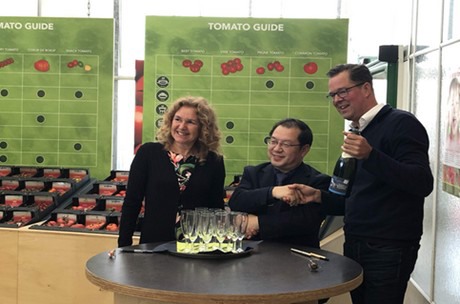
Signing ceremony for Zhongnong Futong and Tomato World
The focus of cooperation between Zhongnong Futong and Tomato World includes cultivation of new product varieties, plantation technology, management experience, marketing methods, and training. These are all important aspects of the tomato industry that require further development. "On the one hand, we hope to exchange information with Tomato World and its members, to learn from years of experience and innovation in the Dutch tomato industry. On the other hand, we also hope that this cooperation will help Tomato World to extend its influence in China and in the Asian tomato industry in general. This will help other members of Tomato World to enter the Chinese tomato market," explained professor Zhang.
"The Chinese tomato industry started quite late by comparison. The Dutch tomato industry experienced problems decades ago that the Chinese tomato industry is facing only now. Apart from this, the overall condition of Chinese agricultural industry is somewhat outdated. The level of technology and the condition of facilities both require large-scale investment. This overhaul of the agricultural industry in China is not something that will happen overnight."
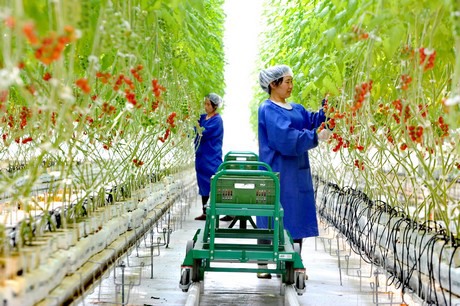
Farmers working inside a greenhouse
"The Chinese tomato industry only just started to develop tomato farms that do not require soil. Regardless of the size of the company, from large corporations to small-scale farmers, everybody is aware of the importance of aeroponic technology for the product quality and the production efficiency of tomatoes. We estimate that close to half of the large-scale tomato producers in China already work with aeroponic technology. Most of the large-scale tomato farms use coconut fiber, vermiculite, or perlite. These are relatively expensive base materials for tomato cultivation. Small-scale farmers without the required economic capacity tend to collect their own material such as straw or peat. These materials are much cheaper. Although the difference in output between traditional tomato farms and aeroponic tomato farms is not yet clear, the latter has obviously become a popular method for tomato cultivation."
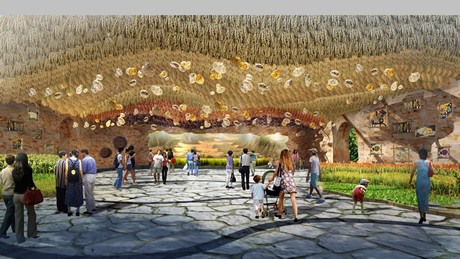
Computer image of the Datong Agricultural Carnival
"Another important topic in the Chinese tomato industry is the question whether Dutch Venlo-style greenhouses are feasible in a Chinese context." According to professor Zhang, several companies do not believe that the either the concept of the Venlo-style greenhouse or the practical installation have any chance of success in China because this approach makes it more difficult for farmers to make a profit.
However, there are some people who disagree with this way of thinking. First, the initial investment for a Venlo-style greenhouse is quite high. When the price of agricultural products is relatively low, people find it difficult to see the economic value of a Venlo-style greenhouse. This economic reality means that the spread of this kind of technology faces many challenges."
"Second, many farmers simply do not have the right conditions for the Venlo-style greenhouse. In the Netherlands the climate is relatively gentle and the Venly-style greenhouse is suitable for these conditions. In China, however, many farmers are in areas that are either too cold or too hot. Under these circumstances, the Venlo-style greenhouse wastes a lot of energy. China is huge and the climate conditions are diverse. Farmers need to pick their spot very carefully and apply whatever method is most suitable for their situation."
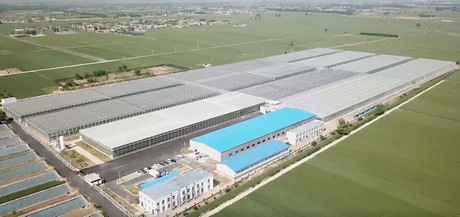
A cluster of agricultural facilities in Nanhe
"The differences between open-field tomato plantation and greenhouse tomato plantation are still quite big in China. Tomatoes grow much better in the conditions provided by greenhouse farms, but for a company that is not the only consideration. Companies have to make a profit."
"The investment required for greenhouse technology must be balanced by the increased output before anyone would consider the development of this technology. We are currently working hard to find a solution that is somewhere in the middle. We want to make a connection between existing facilities in China and greenhouse technology from the Netherlands. We want to improve current horticultural methods and maximize the price-quality ratio of Chinese tomato farms. For example, many Chinese greenhouses are relatively low, which makes them unsuitable for mechanization. We are working to improve the structure of these greenhouses, so that we can apply Dutch greenhouse technology and improve the efficiency of these facilities."
Professor Zhang also stated, "we operate the Beijing International Capital Agricultural Science Park in Tongzhou District, Beijing. This area covers roughly 100 hectares. Here we display various greenhouse solutions. We plan to begin the construction of a Sino-Dutch sunlight greenhouse next year. This project is one of the results of cooperation with Wageningen University."
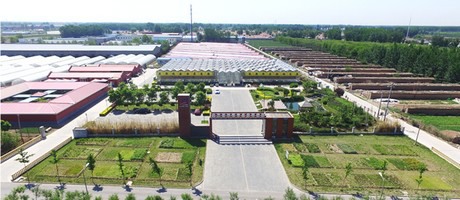
Beijing International Capital Agricultural Science Park
Zhongnong Futong is a high-tech agricultural service company specialized in the planning, design, construction, and management of agricultural plantations and greenhouses. The company has worked closely together with a number of Dutch educational institutions and companies for many years.
Zhongnong Futong is currently the largest company in China in terms of overall surface area devoted to the operation and management of modern, Dutch greenhouse solutions. The company manages more than 70 hectares of modern greenhouses.
"We hope that this cooperation agreement with the Dutch Tomato World will help to strengthen the international brand of Zhongnong Futong. We also hope that this cooperation will help us raise the level of our technology and improve our product quality. This will help us with our next goal, to become the official tomato supplier for the Winter Olympics in Beijing in 2022," said professor Zhang.
For more information:
Song Yi
Beijing Zhongnong Futong Gardening Co., Ltd.
Tel.: +86-13426195053
E-mail: 13426195053@163.com
